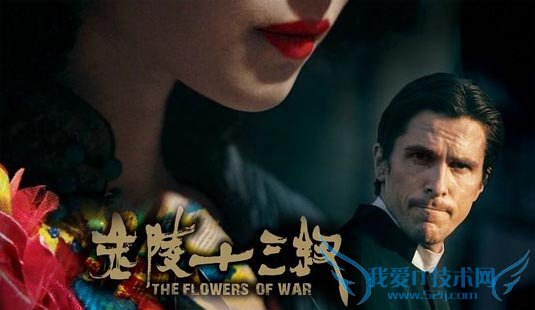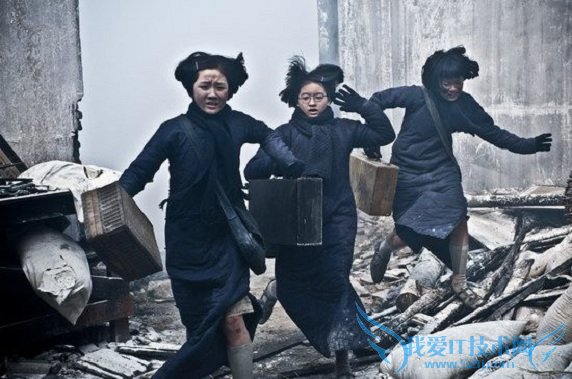��ӭ������52ijӢ��������������С��Ϊ�������Ӣ��֪ʶ�ǣ���������ʮ���Ρ�Ӱ����Ů�ԵĹ�Ժ�Ӣ�۵ı�׳������������ϸ�ķ�����
������ʮ���Ρ�Ӱ����Ů�ԵĹ�Ժ�Ӣ�۵ı�׳

Based on Yan Geling's novel "13 Flowers of Nanjing," the Nanjing massacre plays front and center in director Zhang Yimou's tale. ���ݻ���Ů�����ϸ��ߵ�ͬ��С˵�ı࣬����ı���ݵ����µ�Ӱ������ʮ���Ρ����Ͼ�����ɱ��Ϊ���±��������ġ�
Zhang Yimou's great gift for stories of resilient women serves him well in "The Flowers of War," a uniquely harrowing account of the rape of Nanjing. Simultaneously florid and gritty, this fictitious drama about convent students and prostitutes hiding together from the 1937 Japanese onslaught is a work of often garish dramatic flourishes yet undeniable emotional power, finding humor and heartbreak in a tale of unlikely heroism in close quarters. Considerable advance hype and topliner Christian Bale should help the most expensive production in Chinese history recoup worldwide, though its grave subject matter and 141-minute running time rep not-insignificant obstacles. ����ıչ�ּ���Ů�Թ��µĽܳ��Ż��ڽ���ʮ������չ¶���ţ�����һ��չ���Ͼ�����ɱ�Ķ��ص�Ӱ����Ƭ���������ͣ��鹹�Ĺ���ѧ�����Ů�Ĺ�����ǿ�ҵ�Ϸ�������������в��ɷ��ϵ�����������ں��ν�ִ���Ӣ����������ﻹ���ҵ���Ĭ�����顣���ǵ�ǰ�ڳ���������˹�ٰ������ļ��ˣ��ⲿ�й���Ӱʷ�����ĵ�ӰӦ����ȫ���ջسɱ�����������ص����⼰141����ʱ����ζ��һЩ���ɺ��Ե��ϰ���
Set to open Dec. 16 locally and later this month Stateside for an Oscar-qualifying run, the picture will represent China in this year's foreign-language film race, an official endorsement that eluded Lu Chuan's more somber and nuanced Nanjing chronicle "City of Life and Death" (2009). Boasting a starry pedigree, a broad array of cross-cultural acting styles and enough English dialogue to make some viewers question its foreign-lingo designation, "The Flowers of War" is as total an antithesis to Lu's starkly realist treatment as one could imagine; still, as a rare attempt by a major mainland helmer to tackle a subject that remains an unhealed national wound, its cultural significance can be no more underestimated than its cumulative impact. ��Ƭ����16�����й���ӳ��������Щʱ��Ҳ����Ϊ�����˹�����еķ�ӳ����Ƭ�������й��������İ�˹���������Ƭ��ѡ�����ǹٷ����Ͽɣ����Dz�û��ѡ��½���Dz���������ġ��Ͼ��Ͼ�������Ƭǿ�����ǹ���ͳ���㷺�Ŀ��Ļ����ݷ��Ľ����Լ�����Ӣ����ù��������ⲿ��Ӱ�İ�˹������Ƭ���ԡ�������ʮ���Ρ�ǡ��½����Ӱ�г��������ʵ����Ķ����棻��������Ϊ��������½���漰����һδ���ϵ������˿ڵ����⣬��Ƭ���Ļ���Ҫ�����䲻���ۻ���Ӱ��һ�����ݵ���
Making his way through the bombed-out rubble of Nanjing, American mortician John Miller (Bale) arrives at a cathedral to attend to a recently deceased priest. To the dismay of the church's boy warden, George, and the dozen or so adolescent girl students in his care, Miller turns out to be a genially lazy opportunist who immediately plunders the communion wine supply. �������ݵ�����ʦԼ�����մ����������ڻ��ը��Ŀ������Ͼ��ǣ�ȥһ���������ó�ϯһλ��ʦ�����������������äĿ�ֹۣ�ÿ��ֻ���³��ƣ��ý��ÿ����к����κ��ڽ�������ѵ�Ůѧ�������ʧ����
When a small army of courtesans barge into the church seeking sanctuary from the Japanese, who have overtaken the city, Miller is delighted at the prospect of his own personal harem and flirts aggressively with the only one who can speak English, Yu Mo (Ni Ni). Knowing the Japanese won't attack a white man, Yu demands that Miller help her and the other women escape Nanjing, while George similarly begs him to help shield the students. �ձ���ռ���Ͼ��ųǣ�һȺ��Ů������ñ��ѡ�����Ϊ�Լ�������dz��δ��������ϲ��ʱ�����м�Ψһ��˵Ӣ�ĵ���ī���������ݣ�����̸Ц����ī�����ձ��˲��ṥ�����ˣ�����Ҫ�����հ�������ͬ�������Ͼ�������ͬ���������ӻ���Щ����Ůѧ����
Zhang entertainingly tracks the tensions among this strange gathering of individuals, even staging a near-catfight between the indignant students and their diva-like guests. But the infighting comes to an end when Japanese troops invade the church and, not realizing there are courtesans hiding in the vicinity, try to force themselves on the students -- a sickening scene marked by the girls' screams and the sounds of clothing being ripped, all whipped into a frenzy of terror. Yet the attackers are momentarily held at bay when Miller, in a moment of moral courage finds a way to stop their assault. ����ı�ľ������Եش�������Щ��ָ���֮��Ľ��Ź�ϵ������չ���˷�ŭŮѧ�����������֮��ļ����������ձ�����������ã�����û�з��ֱ�����Ⱥ���м�Ů��������ͼ����Ůѧ��������һĻ����ë���Ȼ�ij�����Ůѧ���ļ���������ﱻ˺�ѵ���������Ӫ���˿ֲ������ա����չ�������վ������ֹ���ձ�ʿ���ı��У�����Ҳ������ʱ�İ�ȫ��
Scene by scene, "The Flowers of War" is an erratic and ungainly piece of storytelling, full of melodramatic twists and grotesque visual excesses, which are nonetheless delivered with startling conviction. Zhang has no interest in sparing the viewer's sensitivity, and his willingness to push past the limits of good taste is what paradoxically lends his film a curious integrity. ����ʮ���ε����²��������³������ŵ����ۺֵ�����Ч������ı�ù������ݸ�������У���������ȥ����ѧƷλ�����µ���Ըʹ��Ӱ��Ϊì�ܵ����塣

On the surface, the most problematic element of Liu Heng's screenplay (adapted from Yan Geling's novel "13 Flowers of Nanjing") is the familiar manner in which it uses a white American character as an entry point for Western audiences. Yet Miller turns out to be just one figure in a panorama that distributes dramatic weight evenly across the board, and allows the students and especially the courtesans to perform unexpected, deeply moving acts of decency and self-sacrifice. While not every character is individuated in the film's large ensemble, the viewer emerges with a sense of a vibrant and varied human tapestry whose colors glow all the brighter in the wake of impending catastrophe. �����Ͽ�������籾����ѡ���ϸ��ߵ�С˵������ʮ���Ρ���������������һ����Ϥ������������·��Ϊ�����������ڵ��������������գ��������ݵĽ�ɫ��ֻ����Ϊһ������Ϸ���ԵĽ�ɫΪ����ӰƬ��ƽ�������ʣ�Ԥ���˿ռ��Ůѧ���ͼ�Ů�ij������ϵı��ݣ������Ǽ�Ů�ǵĸ��к������������˶��ݡ���Ⱥ�������ϣ�������ÿ����ɫ���и��Ի����֣������ܸ��ܵ������ѷ���ǰ���ӹ�ԡ��������ḻ���������ס�
Twenty-four years after starring as a young lad trapped in Japan-occupied China in "Empire of the Sun," Bale has fun playing Miller as a loutish, liquored-up rascal early on before slowly becoming a figure of integrity and fatherly tenderness, a transformation managed by sheer force of movie-star charisma more than anything else. The actor blends in surprisingly well with the mostly non-pro distaff cast, including 23-year-old newcomer Ni, who comes off as stilted in her English dialogue scenes but charges her other moments with a quiet, radiant dignity. ���������ձ��ֻ���ĵ�Ӱ��̫���۹���������һλС�к���24��Ľ��죬���������ɫ�����ڵĴ�³��Ƶ���å����ת��Ϊ��ֱ�������ȸ���Ե�������������ת����Ҫ�鹦����Ա�ĸ�����������������Щ��רҵ��Ա���ںϳ������ϵúã�����23����������ݣ�����Ӣ�ĶԻ�������������ɬ����������������ӵ�а�������ҫ�����ϡ�
Other thesps who register strongly include Atsuro Watabe as a Japanese colonel with a deceptively kind, cultured appearance; Tong Dawei as a heroic Chinese soldier who protects the church with his dying breath; 13-year-old Zhang Xinyi as the brave young student who narrates much of the drama; and Cao Kefan as her desperate, hapless father, a role virtually identical to the one played by dead ringer Fan Wei in "City of Life and Death." ������Ա�������ɲ���������Ŀ��������н������ձ����٣�١��Ϊ�����Ӣ�۸����������õ��й�ʿ����������Ӱ����13��Ůѧ�����������Լ��������Ǿ������ҵĸ��IJܿɷ����뷶ΰ���Ͼ��Ͼ���Ľ�ɫ����
The film's reported $100 million budget is entirely evident in its large-scale battle sequences, shot and staged with intense verisimilitude and impressive spatial coherence. Yohei Taneda's production design, particularly his set for the cavernous cathedral space, reps a staggering feat of period reconstruction in the streets of Nanjing itself. Chan Quigang's score is effective but goes a bit heavy on the violins.��������Ӱ��1����ԪͶ�ʳ�������ڴ��ģ��ս�������ϣ��߶ȱ�����ӵ�кܺõ������ԡ�������ƽ����ƣ��ر��ǽ��õĿռ�У�����˻�ԭ����ųǵľ���׳�١�����ֵ���������Ч������С���ٲ������Գ��ء�
- �����б����������۽������ѱ�����˿���������������վͬ����۵��֤ʵ��������
-
